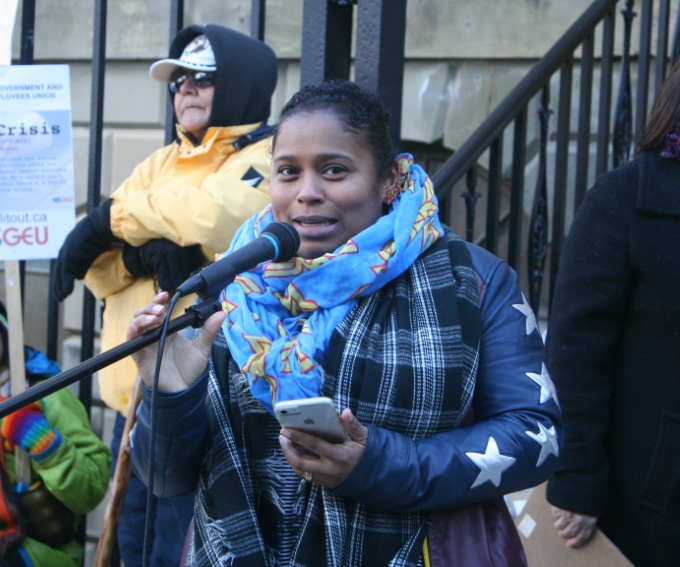KJIPUKTUK (Halifax) – Suzy Hansen, District 5 representative on the Halifax Regional School Board, speaks at today’s Province House rally about the lack of consultation with the Black community, and the loss of important African Nova Scotian voices, while the government pursues the Glaze Report recommendations.
I would first like to say thank you to Karen Hudson of the Black Educators Association and Pamela Lovelace of Equal Voice Nova Scotia for helping with the input of my talk today.

As we see today this govt it’s all about voices being lost. Nurses, teachers, public servants, right now the government is stomping out diversity democracy and progress, silencing our voices. This is a loss of ethical thinking, meaningful conversation, and dialogue for positive change
Much has been discussed by union members, teachers, parents, and school board representatives on the Glaze Report, yet little has been said about the removal of diversity and marginalized voices from local decision making.
A rigid timeline is being adhered to by our government to pass legislation needed to dissolve elected English school boards in Nova Scotia.
Unfortunately, no consultation with those most impacted nor any public participation in that decision took place. A hasty verdict suggests evidence and critical perspectives may not have been fully considered in this decision-making process.
In October 2016, thousands of Nova Scotians went to the polls to express their right to elect school board members. Since then, citizens have called upon those elected representatives to assist them with whatever is needed within the school system
Fast forward 17 months, and we now see the provincial government taking immediate action by following Glaze Report recommendations to dissolve English school boards. The government will need to change the Nova Scotia Municipal Elections Act and the Education Act.
The government’s approach to remove elected members and replace them with already busy and overworked volunteers neglects to address the unintended consequences of stripping elected officials of their fiduciary duties, including the significant challenges this will present for our kids in the system, especially from rural and marginalized communities.
The long, sordid history of racism and sexism in Nova Scotia continues to simmer with this oppressive decision. Women and African Nova Scotians will no longer have a seat at the local decision-making table.
The 2017 United Nations report on the African Canadian experience slammed the provincial government’s treatment of African Nova Scotians citing “educational inequities” and “deplorable” socioeconomic conditions.
In addition to the evidence we already have, the Commission on Effective Electoral Representation of Acadian and African Nova Scotians just published its report outlining the importance of local representation in addressing the needs of African Nova Scotians: “Education is the key to advancement in society, so there is a strong desire to make schools more pertinent to young African Nova Scotians,” states the recent provincial report, It continues to say, “A special measure on school boards to provide African Nova Scotian perspective is consistent with common practice and long-standing in the field of education.”
There is zero reference to the Black Report on Education, addressing inequities and empowering Black learners, one of the most historical prolific reports of the Black community, as well as Enid lee’s reality check to enhance educational opportunities and achievement of African Nova Scotian learners.
The Nova Scotian Black communities are still waiting for recommendations to be implemented from those reports
I am discouraged to learn that the value of elected representatives are seemingly dispensable. In the seven English speaking boards this begs the question of why our basic voting rights and freedoms are being silenced, the voice of our African Nova Scotian elected officials who represent nearly 50 black communities are threatened. The elected African Nova Scotian reps have worked hard to have their voices heard when it comes to issues like closing the achievement gap. What about the learners, who are disenfranchised, they’ve been marginalized for so long, how do we ensure that their voices are heard?
It’s challenging enough for African Nova Scotians to run for politics, the obliteration of an entire level of electoral representation without consultation with the communities they serve demonstrates the government no longer wants their voices included in discussions about them.
As was said by the late Ada Fells – we just got a seat at the table and now they are taking the table away.
I am a Black woman with Black children in the system and I need to see the representation, my kids need to see themselves in our representation, for so long we have been excluded from important positions, and decision making processes.
It is truly a sad day when in 2018 our province can easily remove our voices as African Nova Scotians and strip us of our rights to democracy and yet we have no uproar. This is absurd that as African Nova Scotians, Black people, and Black students, we have to continue this fight for equality, representation and a seat at the table. As a mom I am not going to let this happen to my kids and the kids I serve, our children’s education should be at the forefront of all discussions at the Dept. of Educations level, not how much money we can save.
So far, the department of Education has an agenda to change just about everything in education, but we know nothing of its purpose, except some inaccurate references to test scores that do not relate to the proposed action.
As a mother of six children in the system I ask that if you are going to implement anything from the Glaze Report with the intent of supporting students, how about recommendation #5, wrap around facilities, #13 physical activities/extracurricular coordinator, #17 immigrant support unit, and #19 strategies for students living in poverty, children in care and rural education
Change is needed in the education system, but we should all be concerned about losing our African Nova Scotian reps and strong women from their democratically elected positions. And it shouldn’t be at the cost of our children’s education.



